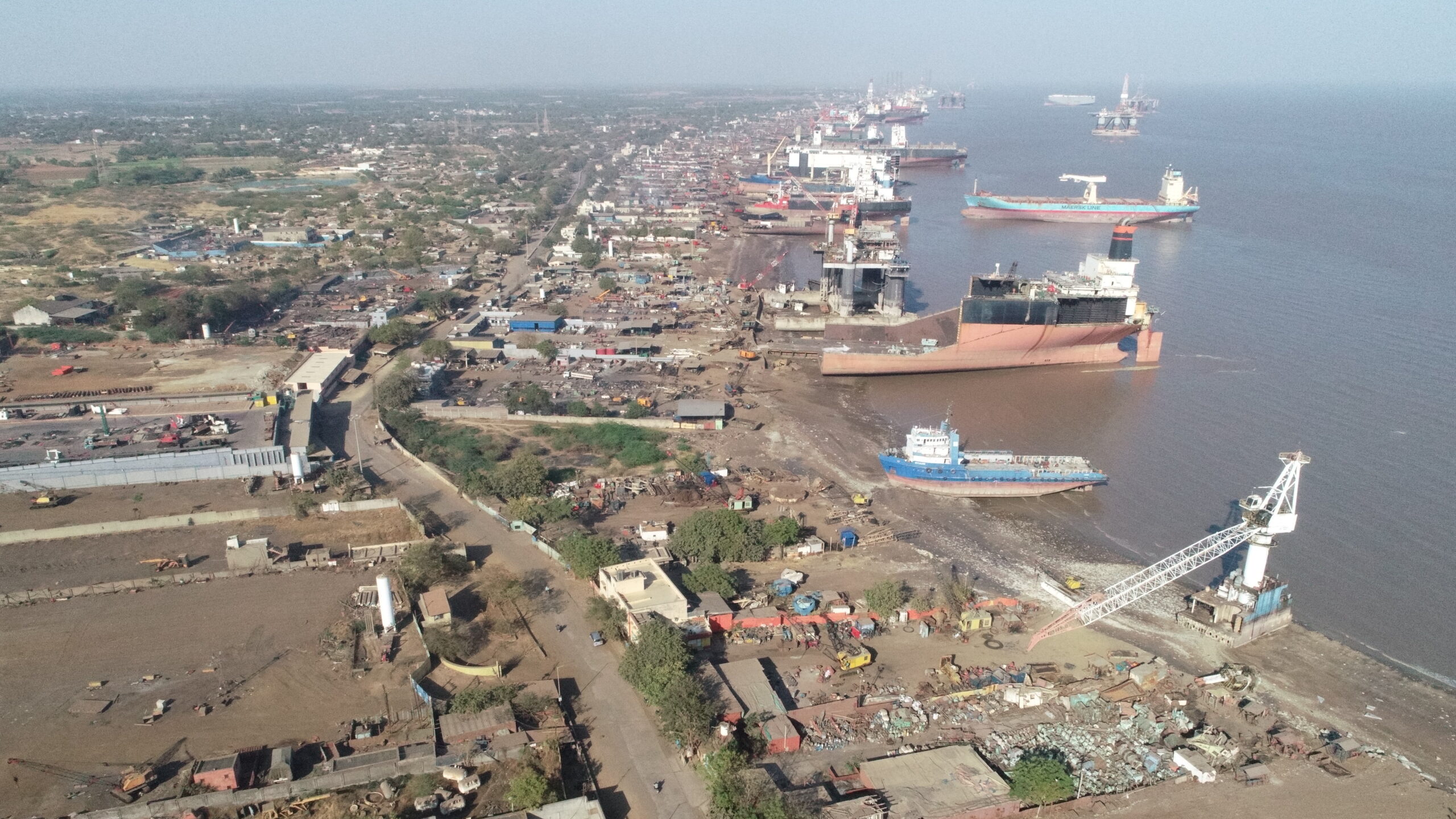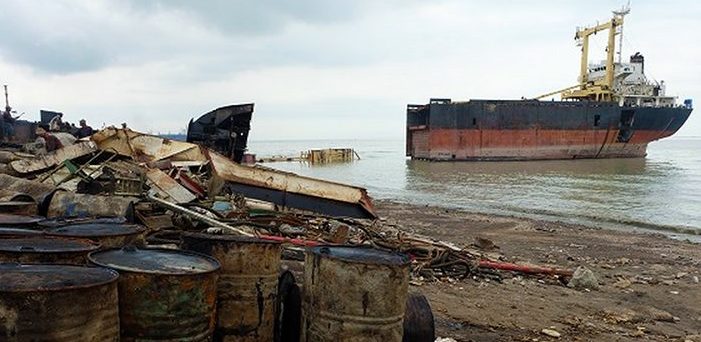Ship Recycling: Market is facing a significant DownTurn: GMS
The global ship-recycling market is facing a significant downturn, particularly in the Indian subcontinent, as reported in GMS’ latest weekly ship-recycling review. Activity across major ship-breaking yards has hit a low not seen for nearly a decade, attributed to weak pricing, a slump in demand, and wavering market sentiment. The sector’s inactivity mirrors the broader uncertainty affecting global trade, compounded by geopolitical tensions, logistical challenges stemming from the COVID-19 pandemic, and an overall economic downturn across key economies.

Geopolitical Tensions and Global Trade
Among the most pressing concerns for the global shipping industry is the growing instability in the Middle East. The region’s current geopolitical dynamics are threatening to escalate into a larger conflict, which could severely impact global trade and maritime activities. The recent assassination of Yachir “Yahyah” Sinwar, the leader of Hamas, by Israeli Defense Forces (IDF) has intensified hostilities. This event prompted a retaliatory missile strike from Iranian-backed Hezbollah forces in Lebanon, hitting Israeli Prime Minister Benjamin Netanyahu’s home. The attack marks a significant escalation in the already fraught Middle Eastern political landscape, with fears growing that it could set the stage for broader military conflicts involving not only Israel and Iran but also drawing in superpowers such as the United States.
As the U.S. increases its military presence in Yemen, targeting Houthi bases, and Israel prepares for potential military action against Iran, the world watches closely. Despite the mounting tensions, surprisingly, crude oil prices have dropped by over 8% since early September. The drop in oil prices comes in the wake of the Organization of Petroleum Exporting Countries (OPEC) and the International Energy Agency (IEA) both cutting their output forecasts, a move that some analysts believe reflects concerns over weakening global demand for energy rather than confidence in resolving Middle Eastern instability.
This paradox—heightened geopolitical tension paired with declining oil prices—has left market observers puzzled. For the shipping industry, the looming question is how these events might affect the flow of goods through critical shipping lanes, especially the Red Sea and Suez Canal, which have already seen significant disruptions over the past year due to strikes on merchant vessels and the infamous blockage of the Suez Canal by the Ever Given. The prospect of an intensifying conflict in the Middle East threatens to exacerbate these challenges, leading many to wonder what will happen next to global shipping and supply chains.
Ship Recycling Sector Suffers Steep Decline
While the world grapples with political uncertainties, the ship-recycling sector faces its own unique set of challenges. According to GMS, sales have virtually ground to a halt in the Indian subcontinent, with ship-recycling activity registering at some of the lowest levels in nearly ten years. Prices for Light Displacement Tonnage (LDT) have plummeted by more than USD 100 since their peak earlier in 2024, with most vessel sales now fetching less than USD 500/LDT. This decline reflects a broader downturn in demand for recycled steel and general economic weakness across South Asia.
In Bangladesh and Pakistan, the situation is particularly dire. Both nations are struggling with economic instability that has caused letters of credit (L/Cs) to dry up, making it difficult for recyclers to secure financing for deals. Even when buying opportunities arise, the financial and economic uncertainties have left shipyard operators reluctant to engage in negotiations. Pakistan and Bangladesh are now firmly at the bottom of the subcontinent rankings, and both countries are grappling with the fallout from their struggling economies.
India, on the other hand, has managed to maintain some level of activity, largely due to its recent collection of Hong Kong Convention-compliant (HKC) vessels from the Mediterranean Shipping Company (MSC). However, even India is facing challenges, as the price of containers—a highly sought-after segment in the recycling market—has dropped below USD 500/LDT on a delivered basis. Additionally, the influx of cheap Chinese steel into the Indian market has created further downward pressure on local steel prices, dampening demand for recycled materials.
Turkey, meanwhile, finds itself similarly marooned in the global ship-recycling market. Turkish shipbreakers are dealing with their own internal challenges, including a weakened Turkish lira and persistent concerns over the country’s steel market. With weak sentiment prevailing across the board, it seems unlikely that Turkish recyclers will be able to significantly ramp up their activity in the near future.
Currency Fluctuations and Steel Prices
Currency movements in the region have been relatively stable in some areas, but Bangladesh and Turkey saw notable declines in the value of their respective currencies this week. This currency weakness, combined with the flatlining of local steel plate prices in both Bangladesh and Pakistan, is adding to the woes of ship-recyclers in the region. India has fared slightly better, but even there, steel prices have shown signs of weakness, raising concerns about the sustainability of the current market environment.
China’s steel prices, which continue to drop, are another major factor affecting the market. The tariffs India has imposed on Chinese steel have done little to control the influx of cheaper steel into the market, exacerbating the problems faced by Indian recyclers. Pakistani recyclers, too, have been hit hard by the availability of cheaper Chinese steel and have chosen to remain on the sidelines, fearful that further price declines could erode their margins even more.
Uncertainty Ahead for Ship Recycling
The overall outlook for the ship-recycling market remains bleak, with analysts predicting that it will take time for the market to stabilize. Freight markets, while performing well in some sectors, are unlikely to provide the volume of tonnage needed to boost ship-breaking activity in the near term. Dry bulk markets, in particular, have cooled off recently, adding to the sense that there will not be enough supply to meet the recycling sector’s needs for the remainder of 2024.
Moreover, the broader geopolitical uncertainties—especially the potential for further military escalations in the Middle East—are likely to weigh on the global economy and the shipping industry. Should a full-blown war break out, the resulting disruptions could send shockwaves through global trade, affecting not only shipping routes but also demand for ships and ship recycling.
In conclusion, the combination of weak demand, fluctuating steel prices, economic instability in key recycling nations, and the threat of broader geopolitical conflict is creating an unprecedented level of uncertainty for the ship-recycling market. Whether the sector can weather these challenges and eventually stabilize remains to be seen, but for now, the market appears to be stuck in a prolonged downturn with no clear end in sight.
Author: shipping inbox
shipping and maritime related web portal








